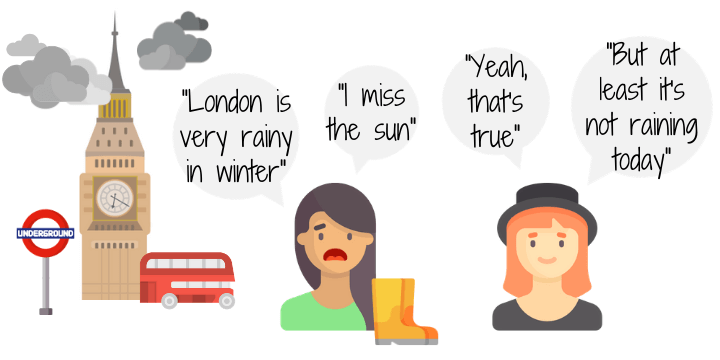La forma de hablar del clima en inglés es bastante parecida al español y, en cualquier caso, también nos vale como conversación improvisada de ascensor ;).
Hay dos construcciones que se usan en inglés para hablar del clima
1 presente continuo
| para hablar del tiempo que hace en ese momento | It is raining |
2 verbo to be + adjetivo
| para hablar del clima en general de un lugar | It is rainy |

it is + verbo—ing
Esta es una frase normal de presente continuo y, por tanto, se usa para hablar del tiempo que está haciendo ese día, el uso normal del presente continuo.
Equivale a nuestro está pero también a hace o hay.
| It is raining | Está lloviendo / Llueve |
| It is snowing | Está nevando / Nieva |
| It is chilling | Hace frío |
Ten en cuenta que aunque en español también podemos expresarlo como un presente continuo, Hoy está lloviendo, igualmente solemos decirlo como un presente simple, Hoy llueve. Además, con algunos verbos, en español solo usamos el presente simple como por ejemplo, Hace frío. Nosotros no decimos Está haciendo frío.
En inglés, no se puede usar el presente simple para hablar del tiempo que está haciendo en este momento, porque el presente simple solo puede expresar las cosas que pasan habitualmente. Si tienes dudas entre el uso del presente simple y continuo, te recomiendo que le eches un vistazo a esta lección.
Fíjate en que usamos el verbo to be para hablar del clima en inglés. En los ejemplos que hemos visto, el to be está en presente, pero basta conjugar el to be en pasado, futuro o el tiempo que queramos para hablar del tiempo que hizo ayer o el que hará mañana.
| It is raining today | Está lloviendo / Llueve |
| It was raining yesterday | Estuvo lloviendo / Llovió |
| It will be raining tomorrow | Lloverá |
it is + adjetivo
Esta forma se suele usar en inglés para hablar del clima en general, del tiempo que suele hacer en una país o ciudad o durante un mes o estación. Equivale a nuestro es pero también a hace o hay.
| it is hot | Hace mucho calor | |
| it is warm | Hace calor | |
| it is chilly | Hace (un poco de) frío | |
| it is cool | Hace (un poco de) frío | |
| it is cold | Hace frío |
| The weather is very cold in winter |
El tiempo es muy frío en invierno |
| It is usually very hot in Spain during the summer |
Suele hacer mucho calor en España en verano |
| it is sunny | Hace sol | |
| |
it is foggy | Hay niebla |
| it is cloudy | Está nublado | |
| it is rainy | Es lluvioso | |
| it is snowy | Nieva | |
| it is windy | Hay viento |
Como puedes ver en el cuadro de abajo, no todas estas palabras que usamos en inglés para hablar del clima tienen verbo y, por tanto, hay que echar mano de it is + adjetivo.
| sustantivo | adjetivo | verbo |
| rain | rainy | rain |
| snow | snowy | snow |
| fog | foggy | — |
| mist | misty | — |
| freeze | freezing | freeze |
| wind | windy | — |
| cool | cool | — |
| chill | chilling | chill |
| cold | cold | cool* |
| sun | sunny | — |
| heat | hot | heat |
| warm | warm | warm* |
* Cool, Heat & Warm no se usan para hablar del tiempo en la forma cooling / heating / warming.
Es decir, también se usa it is + adjetivo para describir el tiempo que hace hoy con expresiones que no admiten it is + verbo —ing porque no tienen verbo.
| It is warm today |
Hoy hace calor |
| It is such a windy day |
Hace tanto viento |
| It was really foggy yesterday |
Ayer hubo mucha niebla |
preguntar por el tiempo
Hablar del tiempo es algo muy común en todos los idiomas pero, dado el tiempo tan malo que generalmente hace en el Reino Unido es, si cabe, todavía más común.
La frase estándar es What’s the weather like? pero, al igual que en español, se puede preguntar de varias formas.
| What’s the weather like? | ¿Qué tiempo hace? |
| How’s the weather today? | ¿Qué tiempo hay hoy? |
| What’s it like outside? | ¿Cómo está el día? |
| What’s the temperature? | ¿Qué temperatura hay? |
Para preguntar por el pronóstico del tiempo usamos.
| What’s the weather forecast? | ¿Cuál es el pronóstico del tiempo? |
Fieles a su sarcástico sentido del humor, es muy común en inglés decir it’s a lovely day —hace un día genial— cuando hace un día horrible.
Under the weather es una expresión muy útil que se usa para responder a How are you? cuando tienes el día pocho. Es como nuestro Como el tiempo.
| Hey man, how are you? | Ey, ¿qué tal estás? |
| Mmm, a bit under the weather | Un poco como el tiempo |
Aquí os dejo un vídeo sobre el clima en inglés que hice. Espero que os guste 🙂





